- Home
- Rosamunde Pilcher
Flowers in the Rain & Other Stories Page 19
Flowers in the Rain & Other Stories Read online
Page 19
It was a humble plea from the heart, and Miles recognized it as such.
He said, “You know, if I’d known what had happened, I mean, about the wedding being called off, I don’t think I’d have turned off the Motorway today. I’d have just bombed on to London.”
“Then I’m glad you didn’t know.”
“I don’t want to start anything up … the same way. I wouldn’t want it to end all over again.”
“If I didn’t know you better, I’d say that was a selfish thing to say. Julia doesn’t need a love affair. But she certainly needs every friend she’s got. You were always such good friends…”
“Until I had to spoil it all by saying something stupid like ‘I love you.’”
“It wasn’t stupid. I never thought it was stupid. It was just ill-timed.”
* * *
The bumpy lane led from the back of the house, down between stone walls smothered in convolvulus. The cottage, where he had lived for those twelve, never-to-be forgotten months, nestled in the lea of its own garden wall. The little gate had come off its hinges and now hung lopsidedly, and beyond it the weeds had taken over. Where once had grown cabbages, potatoes, carrots was a riot of groundsel and waist-high grass. Only the raspberry canes bravely raised their heads above the jungle. There was no sign of Julia.
The back door of the cottage was closed and locked. He went around the flagged path, ducking long thorny branches of bramble and pushing aside the tall spires of purple willow-herb. At the front of the house, he had once grown flowers and had planted a little lawn. The lawn had disappeared, and the flowers were buried in weed. Only the orange marigolds had somehow survived, seeding themselves to spread all over, a carpet of bitter-smelling sun daisies.
She was there; not picking raspberries, not doing anything. Just sitting waist-deep in fiery flower heads. Her dark hair was bundled carelessly up at the back of her head; one or two fronds had escaped and fell across her face. She looked very thin. He did not remember her being so thin. She did not hear his footsteps, and when he said her name, she looked up vaguely, like a person awakened from a dream.
“Julia,” he repeated, and crossed what had once been his garden towards her.
She pushed a lock of hair away from her eyes and stared at him. “Miles.”
“Surprise,” he said, smiling and squatting beside her. “I thought you were meant to be picking raspberries.”
“What are you doing here?”
He explained, simply and briefly.
“Have you seen my mother?”
“Yes, I found her gardening.” He settled himself beside her, crushing the flowers beneath his weight. “But she stopped and gave me a glass of lemonade, and we caught up on all the news.”
“She told you.”
“Yes.”
Julia’s eyes dropped. She picked a marigold head and began to tear it apart, petal by petal. She said, “You must think I’m mad or something.” She sounded as though she was on the verge of tears. He was not surprised. He imagined that she had spent most of the last couple of weeks in floods of weeping. She had always cried easily. For ridiculous reasons, like seeing beautiful sunsets, or hearing choirboys sing “Oh, for the Wings of a Dove.” It was one of the things about her that he had most loved.
He said, “Not at all. I think you were very brave. It takes a lot of courage to call off a wedding at the last moment. But it was right. It was the right thing to do, if you didn’t believe yourself that it was right.”
She said, “It was all too awful even to think about. Mother was marvellous, but Derek was furious with me. He kept saying I was selfish, that I wasn’t considering anybody but myself…”
“Perhaps you were considering Humphrey.”
“I tried to tell Derek that.”
“If you truly love a person, sometimes the best thing you can do for them is to gently let them go.”
“I did love him, Miles. I wouldn’t have said I’d marry him if I hadn’t truly wanted to. He was everything I’d ever imagined and never thought would happen to me. When I met him in London, I couldn’t believe he’d even notice me. There seemed to be so many other girls. But then he asked me out one evening, and after that it all just got better and better. It was like living in a whole new world. As though everything was brighter, and had sharper edges. And then when he asked me to marry him I said yes very quickly, in case he should change his mind. That was how it was. The sort of relationship that doesn’t often happen. It couldn’t.”
“But at the end of the day, you decided not to go through with it.”
She looked away from him, out over the little garden, the crumbling wall, to the pastoral scene that lay beyond. Shallow hills and stands of trees, with peaceful cattle gathered in the shade around the edge of the river.
He said, “Things pass, you know. You have to remember that.”
“It was the most dreadful thing I’ve ever had to do. I felt so conscience-stricken about my mother. She’d been working so hard for months, and all for me. And the vicar, and the reception, and all the guests had to be told. Goodness knows what everybody thought. It was a nightmare.”
“Your mother understood.”
“I almost wanted her to be angry, too. I was so ashamed.”
“Moral courage is nothing to be ashamed about.”
She said nothing to this. He went on, finding it hard to find the right words, but knowing that somehow he had to.
“Things pass, like I said. Time heals. All the old clichés, but they’re true, or they wouldn’t be clichés in the first place. The important thing is that you’re still yourself. Julia. A person. An identity. That’s what you have to hang on to.”
She stayed silent, motionless, and he ploughed on, talking to the back of her head, wondering if she even heard what he said.
“The worst of it is over now. From now on, I’m sure, things can only get better.”
“I can’t believe they’ll ever get better…” Suddenly she turned to him, and for an instant he saw her face, streaming with tears, before she flung herself into his arms. “He … he wanted people to think that it was a decision that we made together…” It was hard to hear what she was trying to tell him, so closely was her face pressed to his shoulder. “But really it was Humphrey who all at once didn’t want any of it to happen. He said he didn’t love me enough … not to give up his freedom. He didn’t w-want me any more…”
A lump filled his throat, and he was suffused with tenderness. He held her very close, his chin against the top of her head, his arms tight around her sob-racked body. He could feel her ribs through the thin stuff of her dress, and her tears were soaking the front of his shirt.
“It’s all right.” He couldn’t think of anything else to say. “It’s all right. It’s over now.”
“I don’t know what I’m going to do…”
“Do you want me to tell you?”
There were a few more sniffs and sobs, and then Julia drew away from him, turned up her streaming face to look into his own. Her eyes were swollen with weeping. He thought that he had never seen her look so beautiful.
She tried to brush away her tears with her hands, and he took out his own clean handkerchief and gave it to her.
“What am I going to do?” she asked him.
“If I told you I had a good idea, would you listen?”
She appeared to consider this. She blew her nose. She said, “Yes.”
“Well, I think you should get right away, have a holiday, meet new people, see new places, get everything that happened into perspective.”
“But where would I go?”
He told her about Scotland. About his farm. About Charlie and Jenny and his own little house. “It’s got a honeysuckle growing over the gate, and a marvellous view of the Sidlaws, and there is everything in the world to be done to it.”
“What sort of everything?”
“Making curtains, mowing the grass, building fences, feeding my hens. Having fun.”
She blew her nose again, and pushed her hair back from a face that by now was becoming less woeful by the minute.
“Oh, Miles, you were always good for me. I always used to feel that nothing too ghastly could happen if you were around. And I know I made you unhappy. Then, I didn’t know how unhappy one person could make another.”
“I’m sorry you had to find out the hard way.”
“I can’t think why you came back to Brookfield. Why you turned off the Motorway.”
“I think it was like swimming, and being caught in a strong current. Perhaps I couldn’t have stopped myself. Perhaps love is more of a constant emotion that I’d ever realized. It becomes part of you. A heartbeat; a nerve end.”
“When are you going back to Scotland?”
“Tonight, on the Motorail.”
“Could I come with you?”
“If you want to. If you don’t take too long to pack.”
“I have to pick raspberries for supper.”
“I’ll help you.”
“It’s … it’s just a holiday, isn’t it? Nothing more.”
“You come home to Hampshire whenever you want.”
“We won’t fall in love. We won’t hurt each other.”
“I don’t think so. And I’m not having all my friends saying I caught you on the rebound.”
She suddenly leaned forward and kissed him, briefly, softly on his cheek. She said, “I think I’d forgotten how nice you are. And comfortable. It’s like being with the other half of myself.”
He did not kiss her back. He said, “For a start, that’s quite a good way to feel.”
* * *
For a start. He knew that events had gone full circle, and now they were both back at the beginning again. Except that now they had both grown up, and were ready and able to cope with all the problems of the old—and yet new—relationship. He thought of the farm, of his future, of all the work that waited to be accomplished. He thought of Charlie and Jenny, and was filled with impatience, as though he could not wait to get home again, to start work, to start building that future that some day he would offer to Julia, like some marvellous present that he had made for her, himself.
WEEKEND
It was a truce weekend. Not a truce from quarrelling, because in the two years that they had known each other they had never quarrelled. And maybe it was not so much a truce as a gentleman’s agreement—that Tony should not ask Eleanor to marry him, backing up this suggestion with a string of sound reasons why she should; and that Eleanor should not say no to him, backing up her refusal with a string of sound reasons why she should not.
He had telephoned her three or four days previously. “I’ve just been told I’ve got a few days’ leave coming to me. If I got into the car, took myself out of London, away from the rat race, and headed for the country, would you be able to come with me?”
Eleanor, snowed under with printer’s galley proofs, a crammed engagement diary, and a potential author playing hard to get, was taken unawares. “Oh, Tony I don’t know. I don’t think I can. I mean…”
“Try,” he interrupted her. “Just try. Speak to that editor-in-chief of yours and tell him you’ve got a sick auntie who has to have her pillow smoothed.”
“It’s not as easy as that…” She pushed her enormous spectacles up onto her forehead and gazed at her work-piled desk.
“Then let’s just make it a weekend. We’ll go on Friday after you’ve finished work, and get back to London on Sunday evening.”
“Where did you think of going?”
“I’d like it to be the south of France, but I don’t think there’s time for that. We could go to Gloucestershire. To Brandon Manor.”
“You mean, where you used to work?”
“That’s right. Wouldn’t you like to see for yourself the hotel where I learned how to decorate function rooms and flambé the larks’ tongues in aspic?”
“I thought only millionaires could afford to go there.”
“Millionaires and employees of the Triangle Hotel Group, of which I am one. I can get a cut-rate deal. Say yes, and I’ll telephone and see if they have an empty room or two.”
“You’re boxing me into a corner.”
“I only wish I could. Say you’ll come.”
Eleanor sighed and thought about it. She was tempted. It was the month of May and she was beginning to feel tired. A weekend in the country, in comfort and quiet, seemed very attractive. The trees would be bursting into leaf, the grass turning green, the birds beginning to sing. Perhaps the sun would shine, it would be warm.
“You won’t…” she started to say, and then stopped. In the corner of the office her little secretary was putting letters into envelopes and trying to look as though she weren’t listening.
“I mean, we aren’t going to…” She stopped again.
“No,” said Tony after a little, “we aren’t going to argue. The subject of wedding rings, wedding bells, any sort of permanence shall be strictly taboo. Let’s just get away from everybody and simply enjoy ourselves.”
Eleanor began to smile. “It sounds,” she told him, “almost irresistible.”
“Only almost?”
“Irresistible, then.”
“If I picked you up at the office about five o’clock Friday evening, would you be ready?”
“Yes, I’ll be ready.”
“Packed and waiting.”
“I’ll pack on Thursday evening, and bring my case into work.”
“What about your car?”
“I’ll leave it in the underground garage.”
He said, “I love you.”
“Tony, you promised.”
“No, I didn’t. I only said I wouldn’t ask you to marry me. The two things, as we already know, seem to have nothing to do with each other.” But he was smiling. She knew from his voice that he was smiling. “See you on Friday.”
* * *
And so now they were nearly there, the long drive behind them, the agonizing crawl out of the city, choked in with weekend commuting traffic. Then the motorway, and the sudden, startling emergence into the country. It had been a fine day, warm and dry, with the first scent of summer in the air. In London, awnings had started to appear, and there were the first roses on the flower stalls. But in the country the signs of the approaching season were less sophisticated. Orchards of fruit trees were awash with tender pink blossoms and cottage gardens bright with forsythia and neat borders of velvety polyanthus. In the Cotswolds, villages and farms drowsed peacefully in the thin evening sunshine, golden stone buildings sheltered by coppices of oak and beech. The road wound ahead of them to the edge of the hills, and then there came a break in the trees, and the view was spread before their eyes, the great flat vale of Evesham, the distant Malvern Hills grey with haze.
“We would go on forever,” said Eleanor. “On and on, till we came to Wales and then to the sea.”
“But we’re not. We’re going to Brandon, and we’re very nearly there.” He changed down, and the car nosed its way down the steep and winding hill, and at the bottom was the scattering of picture-book houses that made up the village. A bridge over a rush-bordered river, water-meadows, more trees, and then the famous gatehouse, the winding drive beyond. She saw the white-painted fence, the horses in the park. A glimpse of a distant lake, the undulations of a small nine-hole golf course. They came around a corner and the old house lay ahead of them, low and rambling, with mullioned windows and steeply sloping roofs of dark slate.
“It’s beautiful,” was all she could think of to say.
“I didn’t bang on about how beautiful it was because I didn’t want you to be disappointed.”
“How long did you work here?”
“About four years. I was assistant under-manager, which means general dogsbody, but I learned everything I know behind those ancient walls.”
“How long has it been a hotel?”
“The family who owned it sold up after the war. Their only son had been killed and there
was no one to inherit. Poor things, I suppose they lost heart. It’s been a hotel ever since. A great favourite with visiting Americans, and honeymooners. It’s even got a honeymoon suite.” Gravel crunched as they drew up on the sweep outside the enormous stone porch of the front door. Tony turned off the engine, loosened his seat-belt, and turned to smile at Eleanor. “But don’t worry. We’re not going to be sleeping in it.”
“I didn’t for a moment imagine that we were.”
“Not that I don’t think it would have been a splendid idea.”
“Tony.” Her voice was full of stern warning. “You promised.”
“What, that I wouldn’t talk about the honeymoon suite?”
“That you wouldn’t mention anything even remotely connected with honeymoons.”
“It’s such a romantic spot, I’m going to find it very difficult.”
“In that case, you’ll have to spend the whole three days playing golf.”
“Will you come and caddy for me?”
“No, I shall find some nice unattached spinster like myself and sit and talk knitting patterns with her.”
Tony began to laugh. “What an unusual weekend we’re going to have.” Unexpectedly, he leaned forward and quickly kissed her mouth. “I love you even more when you try to look cross. Now come along, don’t let’s hang around. We’ll go and see if they’ve got a porter to carry our bags.”
They got out of the car and crossed the gravel, and passed under the dark lintel of the porch and through a pair of inner glass doors. Inside was the hall, stone-flagged. The walls were panelled; a square Elizabethan staircase led to the upper floors. In a cavernous fireplace a fire of logs burned in a bed of grey ash. The flicker of this fire and the ticking of a grandfather clock were the only sounds.
Beneath the turn of the stairs had been discreetly infiltrated a reception desk. Behind it a man in a dark coat stood with his back to them, sorting some mail. He had not heard them come in and did not turn until Tony, coming up behind him across the thick rug, said his name.

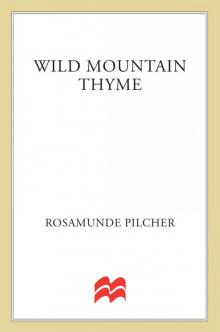 Wild Mountain Thyme
Wild Mountain Thyme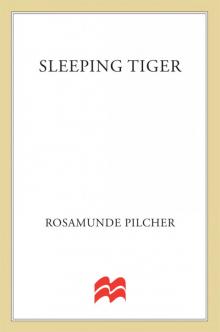 Sleeping Tiger
Sleeping Tiger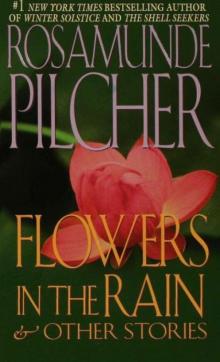 Flowers in the Rain & Other Stories
Flowers in the Rain & Other Stories September
September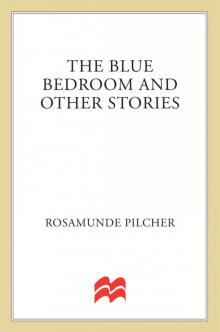 The Blue Bedroom: & Other Stories
The Blue Bedroom: & Other Stories The Carousel
The Carousel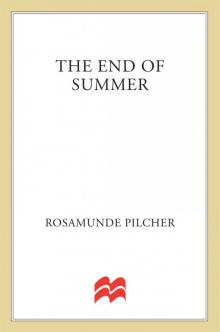 The End of Summer
The End of Summer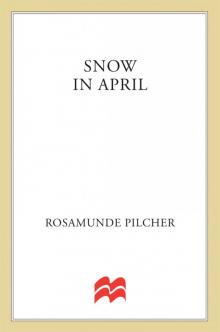 Snow in April
Snow in April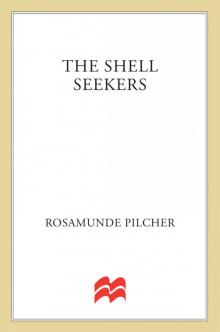 The Shell Seekers
The Shell Seekers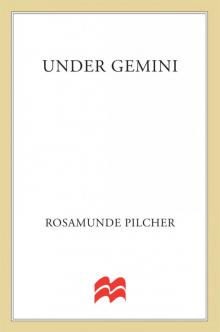 Under Gemini
Under Gemini The Empty House
The Empty House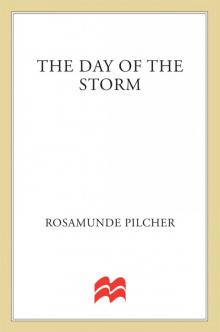 The Day of the Storm
The Day of the Storm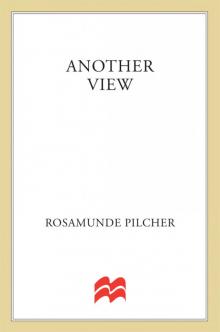 Another View
Another View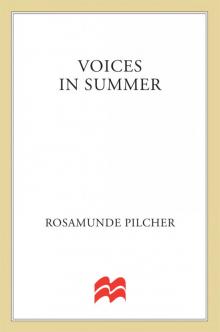 Voices in the Summer
Voices in the Summer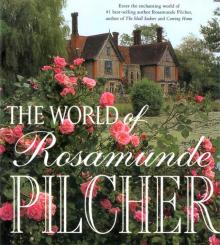 The World of Rosamunde Pilcher
The World of Rosamunde Pilcher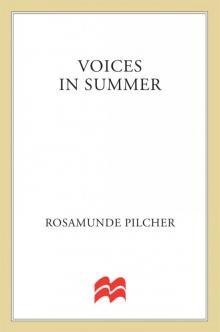 Voices In Summer
Voices In Summer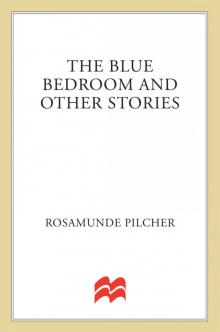 Blue Bedroom and Other Stories
Blue Bedroom and Other Stories